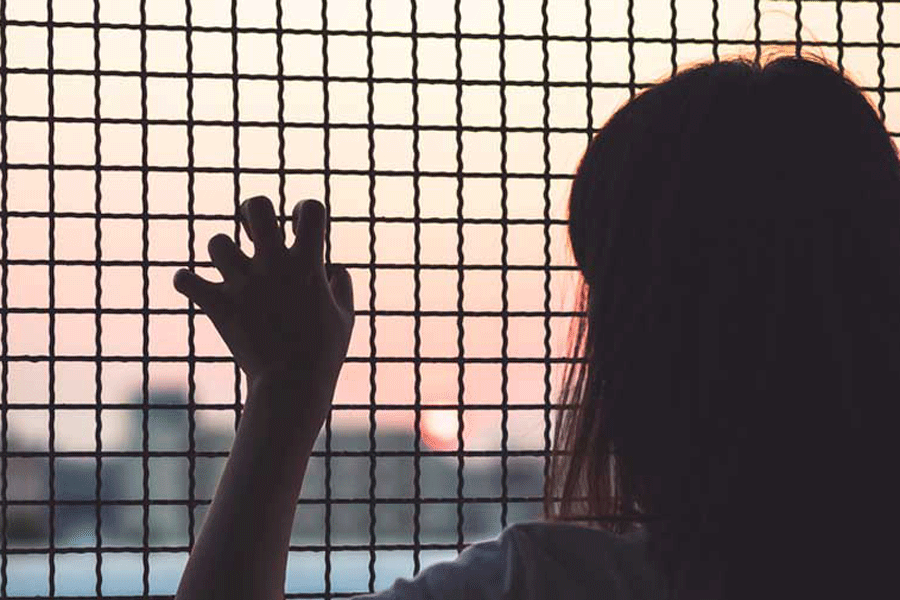A trafficking survivor has received Rs 4 lakh as victim compensation, nearly three years after the formal order was passed.
In 2014, she was barely 12 years old when she was trafficked, allegedly by her dance teacher. She was taken to Delhi and allegedly forced into prostitution.
A social worker who mentored the survivor after her rescue said “she was subjected to medieval brutality”.
The woman, now 21, had the money credited to her account a few weeks ago. The order was passed on January 22, 2021.
This newspaper has reported more than once on the long gap between a victim compensation order and the money being credited to the survivor’s account.
Rights activists who work with trafficking survivors say that in many cases, the delay crushes their spirit. But the South-24 Parganas survivor is not one of them.
She is at the forefront of awareness campaigns — on human trafficking — at schools and local clubs in and around her home. She is married and lives with her husband — who does odd-jobs at a chemical company and works as a delivery partner with an online food aggregator — in an apartment on the northern fringe of Kolkata.
“I don’t want to touch the amount that has gone into a fixed deposit for 10 years. I want to invest some of the remaining amount for my shop and keep the rest for my education. What happened to me was not my fault. I will not let that decide the rest of my life,” the survivor told The Telegraph on Wednesday.
The victim compensation rules in Bengal mandate that three-fourth of the amount is to be deposited in the recipient’s account with a nationalised bank. The remaining is credited in cash.
The survivor, who was 13 when rescued, completed her Madhyamik and Higher Secondary and is now pursuing Bengali honours at a college on the southern fringe of the city. She set up a grocery stall with the help of an NGO.
She keeps travelling between the northern and southern fringes of the city.
“At the campaigns in schools, I tell young girls that technology is both good and bad. I tell them about the perils of sending private pictures online. I tell them the need to prevent child marriage because it can be a stepping stone to trafficking. I tell them not to blindly trust anybody,” she said.
Nine years ago, she did the same mistake.
Her father was a daily wage earner who spent most of the year in the Andaman Islands and Kerala to earn a living.
“She loved dancing and went to a dance teacher. The teacher told her about a big programme that he wanted her to take part in. He advised her against informing her mother as they would leave in the morning and come back by evening. The girl agreed. The teacher eventually took her to Delhi,” said Chaitali Mondal, a social worker with Goranbose Gram Bikas Kendra, an NGO that works with trafficking survivors in South-24 Parganas.
The girl was treated like an animal, Mondal said. “They would shove a thorn apple into her mouth so that she could not shout, and then assault her,” she said.
The case records accessed by this newspaper showed that she was missing from October 28, 2014. A complaint was filed at Basanti police station on November 2, 2014. She was eventually rescued on February 26, 2015. She came back on March 2, 2015, and spent the first few months at a shelter home before going back to her family.
“The first few months, she was so traumatised that she would hardly utter a word. She would tremble in front of strangers. She needed thorough counselling, besides treatment for a host of health problems afflicted by the torture she faced,” said Mondal.
Slowly, she showed signs of recovery. And once she did, her improvement was continuous, Mondal said.
“The purpose of compensation is to help in the immediate rehabilitation of the survivor. A long wait defeats the very purpose of the fund. Many survivors can lose their faith in the justice delivery system if faced with such a delay. An interim compensation at least should be provided within the first six months of an application. Delay defeats justice,” said Mit Guha Roy, the lawyer who assisted the survivor in the application for the compensation.
